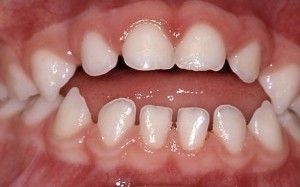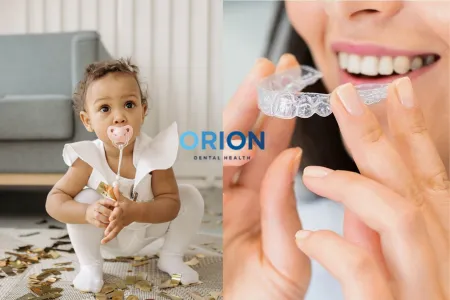What are pacifier teeth in Antalya, Turkey?

Pacifier teeth is the irregular growth of teeth due to long-term pacifier use or thumb sucking. Having an object in the same position in the mouth for a long time affects the growth of teeth. Thus, pacifiers are a physical barrier preventing teeth from fully growing. Over time, the front teeth in the lower and upper jaw deteriorate.
What types of dental issues pacifiers can cause
There is no harm in using a pacifier if it is released at the right time and used appropriately.
Misaligned bites
As a result of pacifier use, teeth become misaligned teeth and the jaw structure deteriorates.
Gingival recession and cavities
As a result of excessive pacifier use, further pacifier tooth disorders occur. Problems such as gum recession and tooth decay are observed.
Thumb Sucking Vs Pacifier - What is Worse for the Teeth?
Pacifier sucking and thumb sucking have the same effect on pacifier teeth. It must be released at the right time. Giving up thumb sucking is more difficult than giving up a pacifier.
Using pacifiers in a way that doesn’t cause pacifier teeth
There is no harm in using a pacifier if it is released at the right time and used appropriately.
Sharing isn’t caring
Sharing a pacifier with someone else causes dental infections Turkey, tooth decay Turkey, gum diseases Turkey, etc. Every baby or child should use their own pacifier.
Get the right size
Buying your baby or child a pacifier that is appropriate for their age is beneficial for the development of their pacifier teeth. Large pacifiers distort the structure of the mouth. Since the shield of small pacifiers will be small, there is a risk of suffocation for the baby or child.
How to fix pacifier teeth in toddlers?
When pacifier use is abandoned, damaged milk teeth will not be permanent. Milk teeth are not permanent teeth. Thumb sucking or pacifier use should be stopped before permanent teeth start to emerge. Since the jaw structures will begin to develop, allowing them to develop without deformation is best. If pacifier use or thumb sucking continues while permanent teeth are present, dental treatment will be required.
Palatal Expanders
A palatal expander is a device used to expand the jaw. It ensures that the teeth and jaw structure regain their natural appearance. The duration of palatal expander use varies depending on the patient's pasific teeth treatment needs and is between a few months and a few years.
Braces | Orthodontic | Invisalign Treatment for Kids Turkey
These are braces Turkey used to bring the pacific tooth to its natural teeth appearance and to treat crooked teeth caused by pacifiers and thumb sucking. Braces Turkey or orthodontic Turkey treatment is used on all individuals, from children to adults, whose permanent teeth have been completed.
Dental Surgery Turkey
Rarely, pacifier tooth surgery Turkey is required to treat pacifier teeth. Surgery is performed when more than one tooth needs to be extracted.It is understood from here that pacifier teeth Turkey should be considered a serious problem.
What makes pacifiers and thumbs great
It is widely known that the sucking reflex calms babies. This sometimes continues as we grow older. Babies and children prefer thumb-sucking or pacifier - to calm down or fall asleep. When babies are weaned, and this need continues, they want to suck a pacifier or their fingers. Finally, some babies do not take a pacifier and instead want to suck their thumb.
How to fix pacifier teeth in adults
There are two methods for treating adult nipple teeth.

1.How to fix pacifier teeth with braces | Orthodontics Treatment | Invisalign Turkey
It is possible to treat your pacifier teeth Turkey problems from childhood with braces Turkey, orthodontic treatments Turkey and Invisalign in Antalya, Turkey. After this treatment, your teeth regain their natural appearance. You will feel better in your social environment after invisalign Turkey treatment.
Once we establish your treatment plan, Invisalign creates custom clear aligners Turkey made with smooth, comfortable plastic that gradually and gently shifts your teeth into place. You’ll need to wear your clear braces throughout the day, and remove them when you eat, brush or floss.
2.How to fix pacifier teeth with dental veneers in Antalya, Turkey
Laminate veneers Turkey, emax veneers Turkey and porcelain veneers Turkey give instant results in the treatment of teat teeth. It hides the cracks and breaks in your teeth.
Dental veneers Turkey are a thin layer attached to the front surface of teeth. They are also used in treatments such as Hollywood Smile Turkey to provide a perfect and natural smile.
FAQ
Which pacifier nipple shape is best?
There is no study showing that one pacifier is superior to the other. The important thing is to leave it at the right time and not need pacifier tooth treatment.
Is a round nipple bad for the teeth?
There is no study showing that one pacifier is superior to the other. The important thing is to leave it at the right time and not need pacifier tooth treatment.
Are “pacifier teeth” dangerous?
No, pacifier teeth Turkey are not dangerous. Dental appearance makes an individual feel better in childhood and adulthood. Pacifier use should be stopped until the age of 3. If a pacifier tooth appears before the age of 3, it is useful to see a dentist Turkey.
Do pacifiers affect the permanent teeth?
Yes, permanent teeth are permanent if they have pacifier teeth Turkey. Don't worry, there is pacifier tooth treatment for both children and adults.
The takeaway
As this article by Orion Dental Turkey shows, dental veneers Turkey and Invisalign Turkey treatment are the best solutions. Please contact your Turksih dentist for detailed information and a free consultation.
